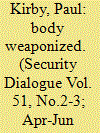|
|
|
Sort Order |
|
|
|
Items / Page
|
|
|
|
|
|
|
| Srl | Item |
| 1 |
ID:
120703


|
|
|
|
|
| Publication |
2013.
|
| Summary/Abstract |
In this essay, I argue that alienation and familiarity serve as mobile matrices for understanding the affectively experienced impact of transnational migration in certain of Jhumpa Lahiri's short stories. While we may think of alienation as a precondition of migrant identity, it is a condition that is familiar to most of us in different contexts. How does alienation, thus plurally conceived, figure in the experience of migrants, producing the relay between heimlich/unheimlich experiences? Moreover, in the socio-cultural context of globalisation, how does transnational migration challenge conventional notions of family, a word associated with notions of familiarity and filiation that are seemingly antonymous to the idea of alienation? These are the questions I set out to answer, concluding that the 'family' is always a unit composed by its very hauntings, surrogates, and absences.
|
|
|
|
|
|
|
|
|
|
|
|
|
|
|
|
| 2 |
ID:
175123


|
|
|
|
|
| Summary/Abstract |
It is today common to argue that rape is a weapon, tool or instrument of warfare. One implication is that armed groups marshal body parts for tactical and strategic ends. In this article, I interrogate this discourse of embodied mobilization to explore how body weaponry has been made intelligible as a medium for sexual violence. First, I show that, despite wide rejection of essentialist models, the penis and penis substitutes continue to occupy a constitutive role in discussions of sexual violence in both political and academic fora, where they are often said to be like weapons, a tendency I term ‘weapon talk’. Second, I trace the image of the body weapon in key threads of feminist theorizing and commentary, to show how the penis has appeared as a ‘basic weapon of force’ in various permutations. Third, I explore the weaponization of the body as it appears in military thought and in the cultural circulation of ideas about the soldiering body in which sexual pleasure and violence are frequently conflated. Building on this foundation, I propose that these literatures collectively describe an uncanny weapon object, and I draw out the significance of this term for feminist security studies and martial empiricism. In short, the uncanny haunts accounts of sexual violence in the collision of sexuality and machinery in the image of a body weapon, in the unsettling designation of sexuality as itself both familiar and dangerous, and in the strange movement of violent bodies across the boundary between wartime and peacetime. A concluding discussion draws out implications and challenges for thinking about embodied violence, advocating renewed attention to the history of weaponization as a fallible and confounding process.
|
|
|
|
|
|
|
|
|
|
|
|
|
|
|
|
|
|
|
|
|